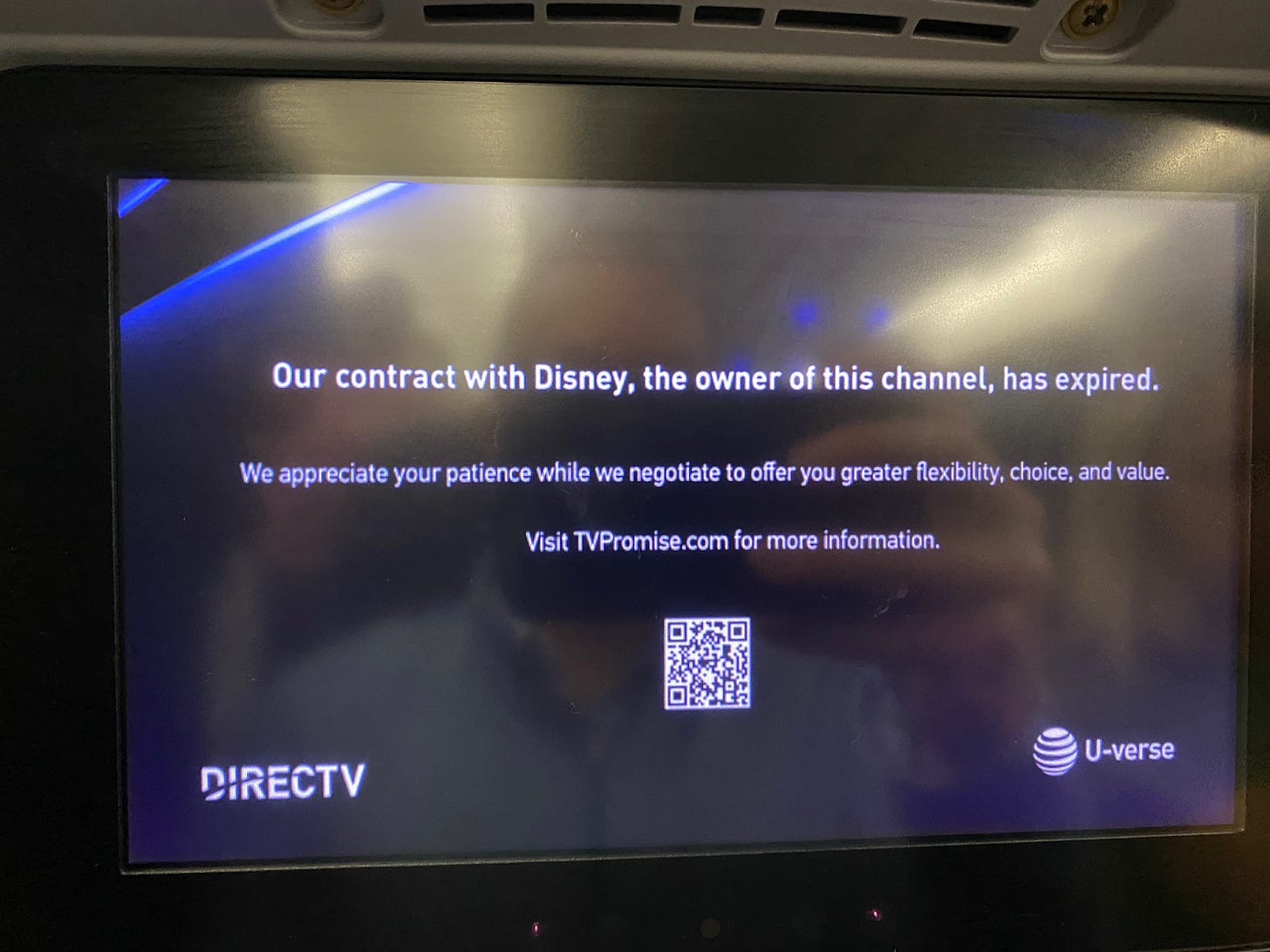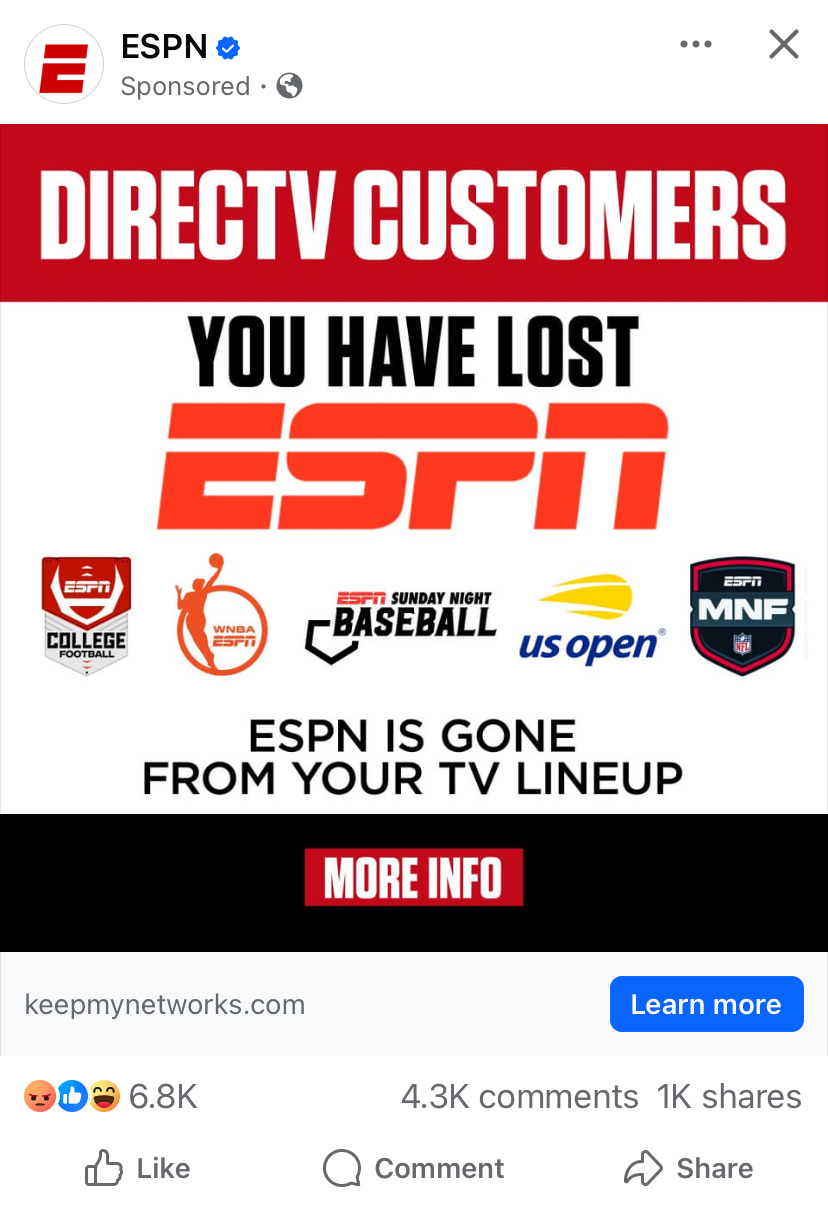DirecTV v. Disney is not just about sports; It could be about the future of MVPDs
Carriage disputes have fascinated me for years
For more than a decade, I have held a strange fascination with carriage disputes. In fact, the topic has remained a focal point for my research, including one of my first peer-reviewed publications. That study, with Trent Seltzer, now at Texas Tech University, was published in the International Journal of Sport Communication in 2009 and examined the framing and agenda setting of key messages around the NFL Network carriage dispute of 2007.
Carriage disputes, like the current dust-up between DirecTV and Disney (owner of ABC and ESPN), are becoming an annual tradition. Why these occur is, as I wrote in this space last year when Disney had a similar disagreement with Spectrum, a uniquely American thing. Multi-video program distributors (MVPDs) such as DirecTV and any number of regional cable providers such as Spectrum and Xfinity bundle networks to deliver consumers for a monthly rate, increasingly closer to $100 per month.
Content providers, such as Disney or Warner Brothers (owner of TBS, TNT, etc.), charge MVPDs a per subscriber fee to carry their programming/networks. Often these content providers bundle their channels, forcing MVPDs to carry some networks (e.g. National Geographic) that don’t deliver viewership as large other networks (e.g. ESPN). Because live sports is the most valuable video content, networks that broadcast sports are among the most expensive per sub.
We are one of the few counties to have not passed anti-siphoning legislation that would have prohibited the migration of nearly all major sports programming to pay television, making subscription to an MVPD critical for sports fans. In addition, the 1992 Cable Act enables broadcast networks to collect retransmission fees from MVPDs in order to retransmit the networks' signal, given to them free by the U.S. government. In other words, consumers are paying for a signal they could receive free with an antenna. Disney, for example, owns eight local ABC affiliates including those in the largest DMAs (New York, Los Angeles, Chicago, Houston, etc.). So, those local ABC stations are also dark on DirecTV in their markets
As I write this, DirecTV and Disney do not have an agreement, with Monday Night Football less than 24 hours away. Indeed, this one feels different, both from a messaging standpoint and a business perspective.
The above message stared at me from the back of seat 23D on Delta flight 2734 from CLE to ATL on Sept. 3. It was polite, professional. When I visit the website tvpromise.com today, the dominant message is anything but polite.
In fact, the messaging has become increasingly mean-spirited. Earlier today (September 8), DirecTV filed a formal complaint with the Federal Communications Commission accusing Disney of negotiating in bad faith. DirecTV argues it wants to offer Disney networks in a skinny bundle (e.g. a “sports only” bundle), but Disney is refusing. Meanwhile, DirecTV points out, until a recent court ruled it could not proceed, Disney had planned to launch its own skinny bundle, called Venu, as part of a joint venture with Fox Sports and Warner Brothers. Hence DirecTV’s argument that Disney is not negotiating in good faith.
The approach by DirecTV is different in that by citing fuboTV Inc. v. Walt Disney, Co., DirecTV is essentially siding with one of its MVPD competitors, fuboTV. But, it makes sense. If Disney is allowed to proceed with Venu, or once Disney has its own direct-to-consumer product some time in 2025, it is likely that both DirecTV and fuboTV will lose customers and market share. As DirecTV has stated, all it has is the distribution system. It does not have content, like Disney does. And Disney has spent a fortune to acquire the rights to high-profile properties such as Monday Night Football, the U.S. Open, and college sports.
“Disney has violated the FCC’s good faith mandates by predicating any licensing agreements on DIRECTV’s waiving any legal claims on Disney’s past, current, or future anticompetitive actions, including its ongoing packaging and minimum penetration demands,” a DirecTV spokesperson said in a statement.
For their part, Disney has positioned this as a decision made by DirecTV to deny consumers Disney content. “DirecTV chose to deny millions of subscribers access to our content just as we head into the final week of the US Open and gear up for college football and the opening of the NFL season,” said Dana Walden and Alan Bergman, co-chairmen, Disney Entertainment, and Jimmy Pitaro, chairman, ESPN, in a statement.
Disney has its own messaging strategy to support this theme. On its website, keepmynetworks.com, the company reminds DirecTV customers they have alternate providers to deliver ESPN and other networks. One of the suggestions is fuboTV, the company currently suing Disney, and the MVPD referenced by DirecTV in the FCC complaint.
The war of words has become increasingly contentious, with both sides appearing to dig their heels. DirecTV, which has stated it is playing the long game, last week coined this clever statement, “Disney’s only magic is forcing prices to go up while simultaneously making its content disappear.”
One year ago, I concluded the Disney-Spectrum agreement would end quickly, and it did, lasting a total of 12 days and being settled just prior to the MNF opener. A lot has changed, and I am less confident this one will be settled.
This is not merely a traditional carriage battle over how much Disney will receive per subscriber from DirecTV, in many ways it is about the future of MVPDs.
Shameless self promotion, my friend and former student Matt Jones of Whole Hog Sports in Fayetteville, had me on his podcast this week to discuss the situation. My segment begins at 37:30 if you are really bored.









This really seems like a bitter battle - moreso than the ones in years past. Do you think this is going to drag through football season? Seems like neither side is really willing to give anything